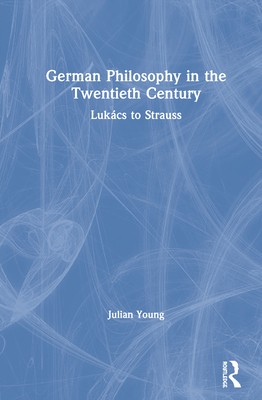
- We will send in 10–14 business days.
- Author: Julian Young
- Publisher: Routledge
- ISBN-10: 0367468204
- ISBN-13: 9780367468200
- Format: 16 x 23.6 x 2 cm, kieti viršeliai
- Language: English
- SAVE -10% with code: EXTRA
Reviews
Description
The course of German philosophy in the twentieth century is one of the most exciting and controversial in the history of human thought. In this outstanding and engaging introduction, a companion volume to his German Philosophy in the Twentieth Century: Weber to Heidegger, Julian Young examines and assesses the way in which some of the major German thinkers of the period reacted, often in starkly contrasting ways, to the challenges posed by the nature of modernity, the failure of liberalism and the concept of decline.
Divided into two parts exploring major intellectual figures of the left and right respectively, Young introduces and assesses the thought of the following figures:
- Georg Lukács: the critique of capitalism: alienation, reification, and false consciousness
- Ernst Bloch: the Marxist utopia
- Walter Benjamin: the confluence of phenomenology and left-wing thought: the Arcades Project, aura, and the technological reproduction of the artwork
- Oswald Spengler: the pessimistic right and the concept of Western decline
- Max Scheler: Catholic conservatism and the 'objective hierarchy of values'
- Carl Schmitt: the failure of liberalism, dictatorship, 'friends' versus 'enemies'
- Leo Strauss: the rejection of moral relativism and the return to classical philosophy.
Highly relevant when the viability of liberal democracy is again called into question, German Philosophy in the Twentieth Century: Lukacs to Strauss is essential reading for students of German philosophy, phenomenology and critical theory, and will also be of interest to students in related fields such as literature, religious studies, and political theory.
EXTRA 10 % discount with code: EXTRA
The promotion ends in 21d.05:36:38
The discount code is valid when purchasing from 10 €. Discounts do not stack.
- Author: Julian Young
- Publisher: Routledge
- ISBN-10: 0367468204
- ISBN-13: 9780367468200
- Format: 16 x 23.6 x 2 cm, kieti viršeliai
- Language: English English
The course of German philosophy in the twentieth century is one of the most exciting and controversial in the history of human thought. In this outstanding and engaging introduction, a companion volume to his German Philosophy in the Twentieth Century: Weber to Heidegger, Julian Young examines and assesses the way in which some of the major German thinkers of the period reacted, often in starkly contrasting ways, to the challenges posed by the nature of modernity, the failure of liberalism and the concept of decline.
Divided into two parts exploring major intellectual figures of the left and right respectively, Young introduces and assesses the thought of the following figures:
- Georg Lukács: the critique of capitalism: alienation, reification, and false consciousness
- Ernst Bloch: the Marxist utopia
- Walter Benjamin: the confluence of phenomenology and left-wing thought: the Arcades Project, aura, and the technological reproduction of the artwork
- Oswald Spengler: the pessimistic right and the concept of Western decline
- Max Scheler: Catholic conservatism and the 'objective hierarchy of values'
- Carl Schmitt: the failure of liberalism, dictatorship, 'friends' versus 'enemies'
- Leo Strauss: the rejection of moral relativism and the return to classical philosophy.
Highly relevant when the viability of liberal democracy is again called into question, German Philosophy in the Twentieth Century: Lukacs to Strauss is essential reading for students of German philosophy, phenomenology and critical theory, and will also be of interest to students in related fields such as literature, religious studies, and political theory.


Reviews